How To Become a Data Modeler: 2023 Career Guide

In this article
You can think of data modelers as being the unsung heroes of the data science process. While methods of collecting, analyzing, and interpreting data may get more attention, none of this can be done if the data isn’t organized and retrievable, and that’s exactly what data modelers do.
If you’ve got an aptitude for organization, and are considering a career in data science, then you should definitely be considering a career in data modeling. If that sounds like you, then look no further. Our 8-step guide covers everything you need to know about a career in data modeling— from educational requirements to essential skills and average salaries—so that you can launch your career today.
What Does a Data Modeler Do?
A data modeler is a database designer, someone who maps out the optimal way for an organization’s data to be stored. Using a variety of skills, data modelers work with stakeholders and other IT professionals to create solutions that make data easier to access, understand, and analyze.
Is It Hard To Become a Data Modeler?
Becoming a data modeler is possible for anyone willing to put in the work. With encouraging growth prospects and plenty of openings, there are many opportunities for newly trained juniors to land their first entry-level role. There are also different paths into the industry other than a standard college education.
How To Become a Data Modeler: An 8-Step Guide

If you’re interested in becoming a data modeler, there’s a lot to do before you land your first job. However, the first step is one of the easiest—just open up your laptop and choose a way to study.
-
Learn the Basics
-
Meet the Educational Requirements (and Continue Learning)
-
Learn Popular Data Modeling Tools
-
Develop and Hone the Essential Skills
-
Find a Mentor
-
Gain Practical Experience Through an Internship
-
Remember: Your Network Is Your Net Worth
-
Polish Your Resume, Start Applying for Jobs and Prepare for Each Interview
Learn the Basics
While studying a data-related field at college is still a great option, it’s no longer the only one. Part of what makes the tech industry so accessible for new learners is the number of resources and training you can find online.
To learn the basics, you can study independently or take introductory online courses. You can also fast-track your education with online data science bootcamps, analytics, or engineering bootcamps. With industry-leading curriculums and expert instructors, these bootcamps can take beginners to work-ready levels in under a year.
Meet the Educational Requirements (and Continue Learning)
Most employers will want to see some form of education or certification of your skills before they employ you. If you’re not attending college, you can do this by passing industry-standard certifications or graduating from a bootcamp, and creating a professional portfolio.
The interview is where you’ll show off your skills in full and actually land the job, but you’ll still need to create a high-quality resume in order to get a job interview in the first place.
Learn Popular Data Modeling Tools
Tools are an important part of a data modeler’s skill set, and you’ll use them on every project to create conceptual, logical, and physical data models. Not everyone uses the same software, so it’s good to familiarize yourself with multiple tools so you can appeal to more employers.
Structured Query Language (SQL)
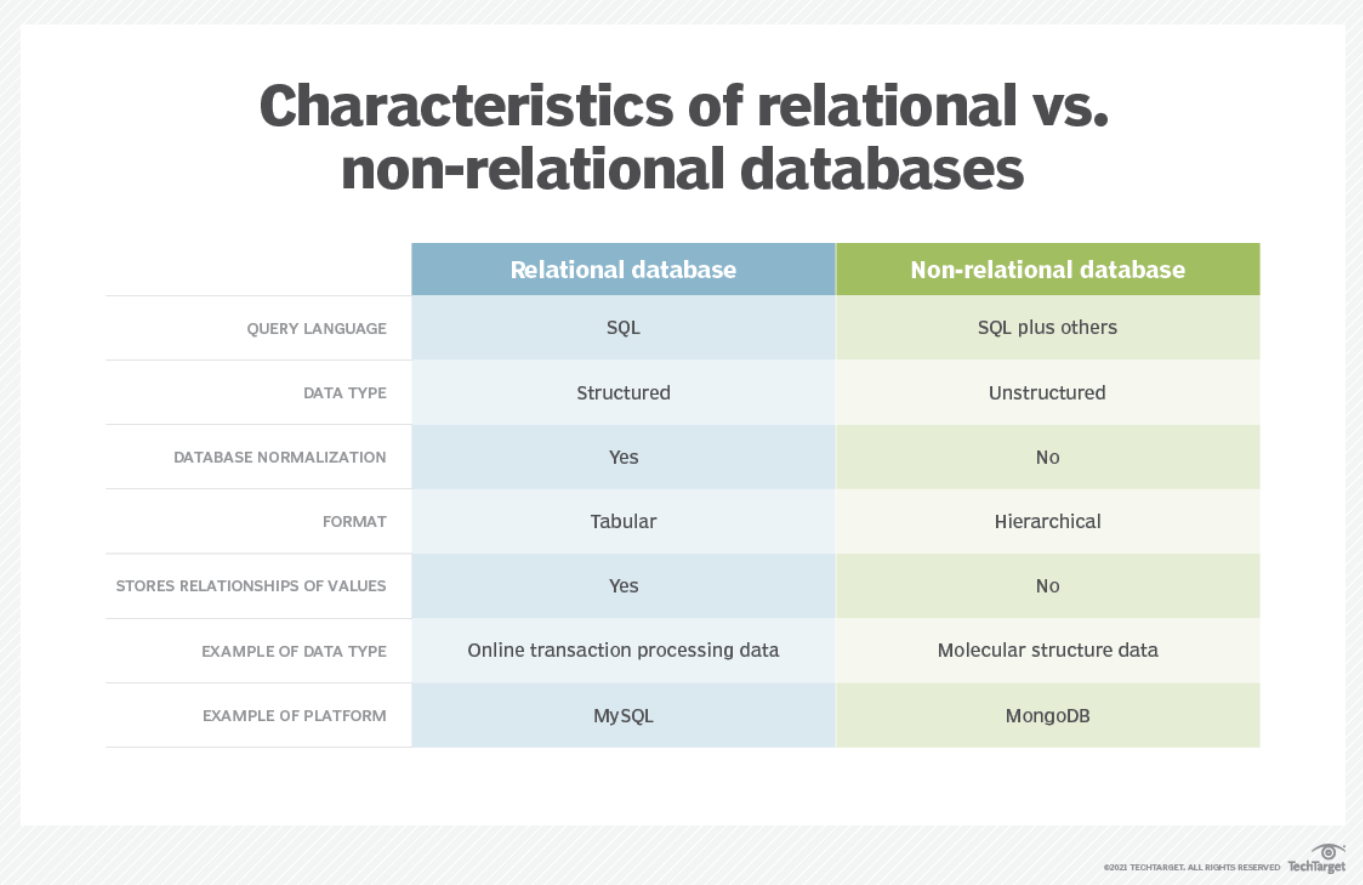
SQL skills are a must for anyone working with data, as it’s a standardized programming language that’s used to access, manage, and manipulate data in relational databases. You can use it to execute queries against a database, retrieve data, delete or insert new data, and many other tasks.
Related Read: 10 Best SQL Certifications To Grow Your Skillset
erwin Data Modeler
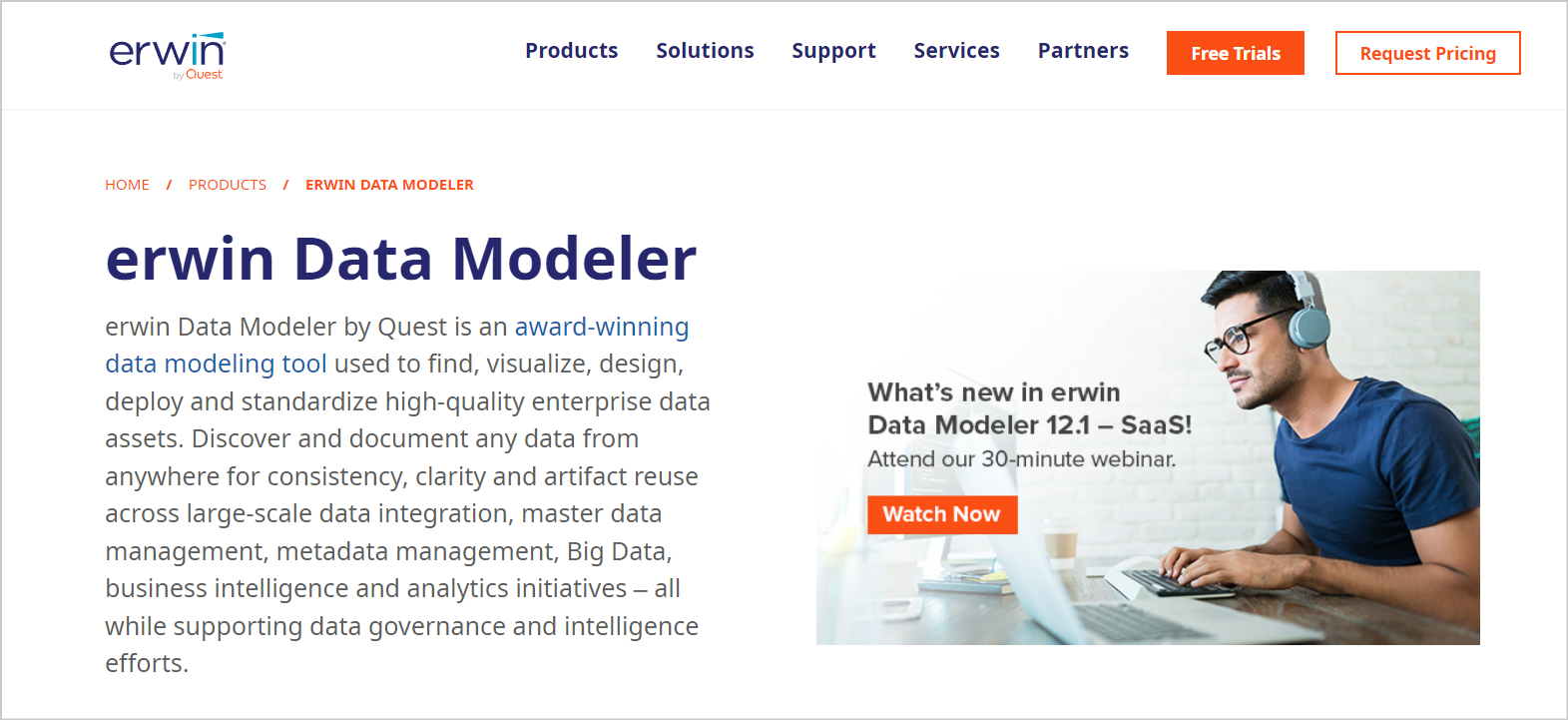
The erwin Data Modeler has been a staple piece of software in the industry for over 30 years and is trusted by a number of Fortune 500 companies. It helps data modelers automate complex tasks and reduce errors in their designs so they can produce high-quality conceptual, logical, physical, and relational models more efficiently.
ER/Studio
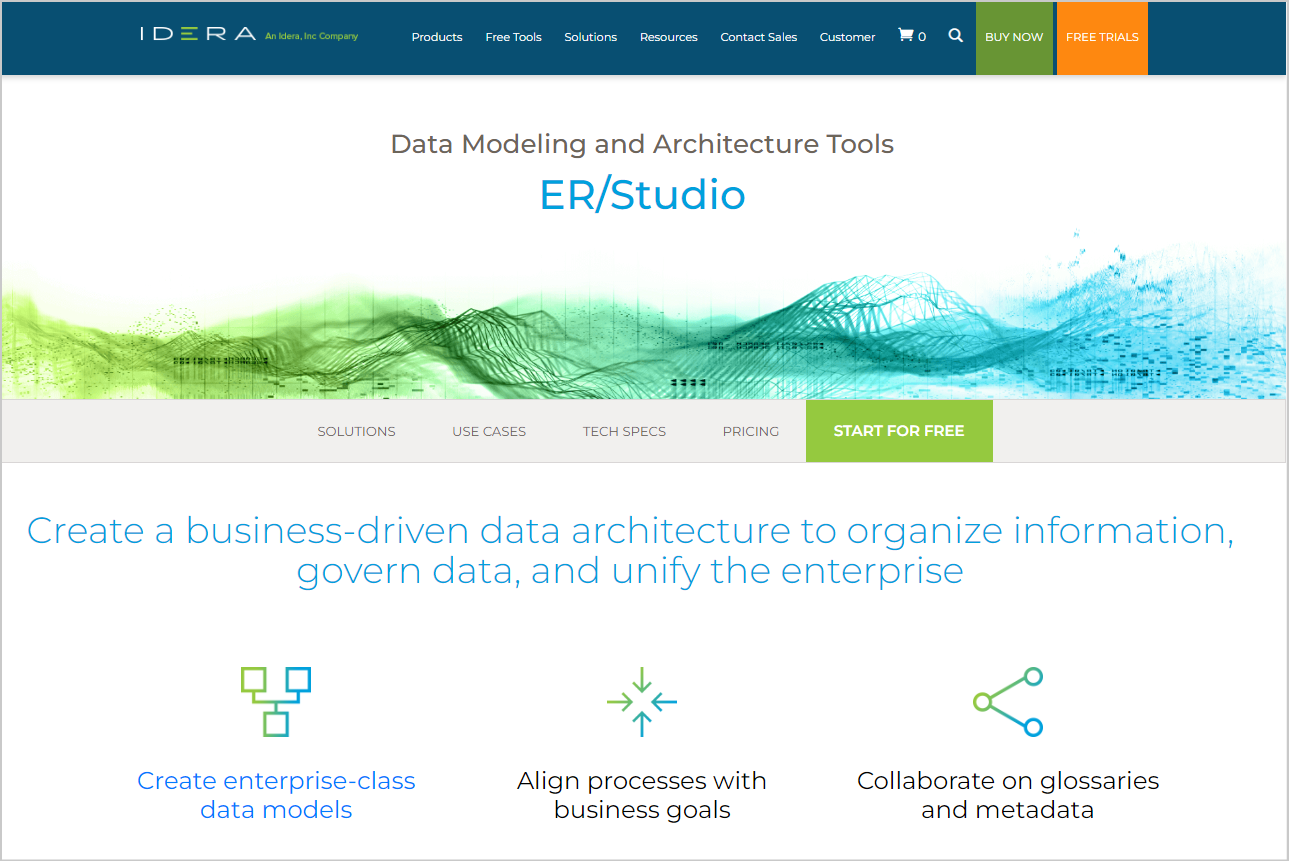
The ER/Studio suite includes a range of products for data modeling, conceptual modeling, and business glossaries. It allows data architecture teams to design and implement data solutions from start to finish while keeping the information accessible across the whole organization.
Lucidchart
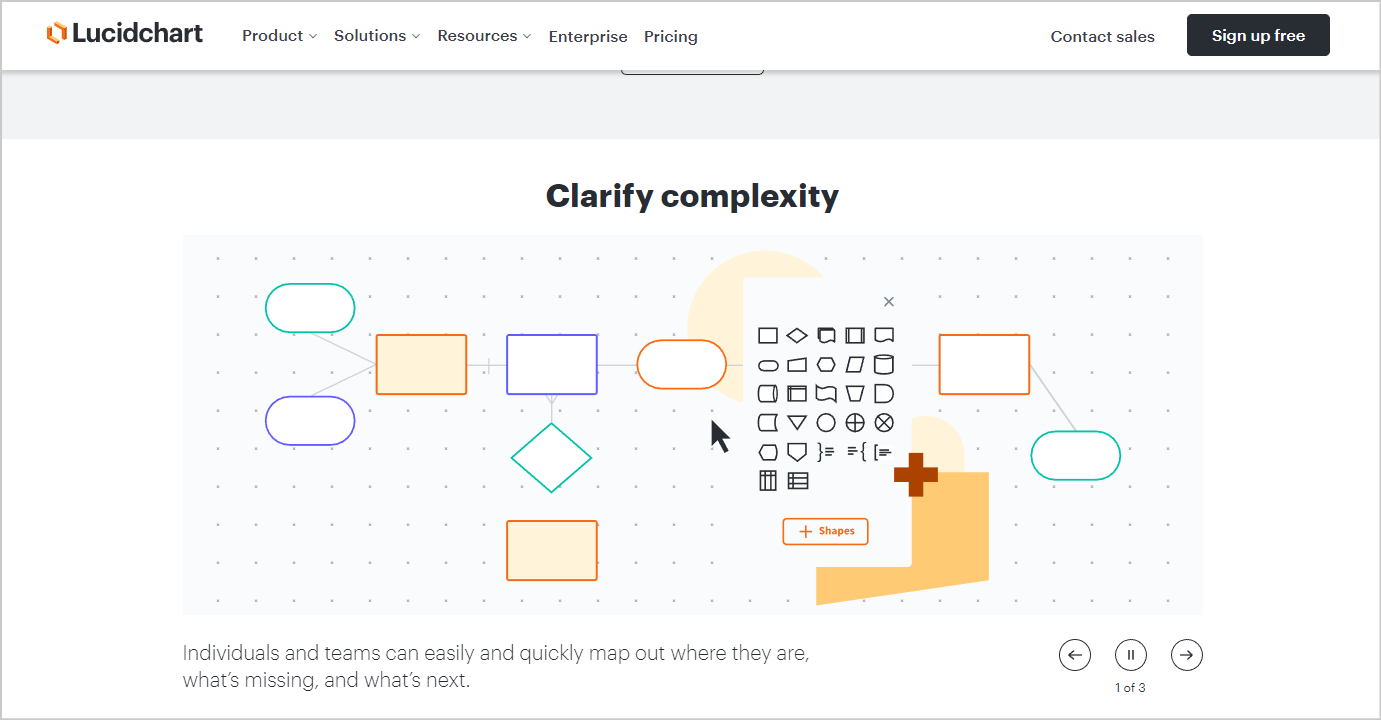
Lucidchart is a streamlined and collaborative diagramming application that can be used to visualize technical systems, among other things. Teams can use it to create conceptual data models that grow and improve as more members contribute to it. It’s used by 99% of Fortune 500 companies.
Develop and Hone the Essential Skills
Whether you’re studying independently or with an institution, a good way to develop a sense of the crucial skills you need for data modeling is to read job descriptions. This way, you can see exactly what skills and tools companies expect.
Technical Skills
Technical skills and knowledge are very important for data modelers, as you need to know both how to build data models, and how to design systems on a large scale. Technical requirements you’ll often see on job descriptions include:
- Proficiency in relational SQL and NoSQL database technologies
- Experience working with data modeling tools such as erwin or ER/Studio
- A deep understanding of database management and design best practices on an enterprise level
- Experience with and examples of conceptual, logical, and physical data modeling
- Understanding of business intelligence concepts
- Knowledge of metadata management and organizational data structures
Soft Skills
Data modelers work to design innovative data solutions according to an organization’s needs, and they rarely work independently. Because of this, strong collaborative, communication, and interpersonal skills are essential for the job. These include:
- Work and communicate with business stakeholders to ensure deliverables meet business expectations
- Work with technical teams to deliver on commitments
- Collaborate with database administrators, data analysts, and data architects to build scalable solutions
- Visualize and communicate complex data structures and concepts clearly and intuitively
- Organizational skills
- Experience delegating work
- Ability to work under pressure
- Self-motivation
- Analytical skills
Find a Mentor

Having an experienced industry professional in your network can be highly valuable at the beginning of your career. Mentors can answer all kinds of questions, anything from work-life balance questions, to technology trends and navigating the corporate hierarchy.
You can find a mentor in various places, such as online communities, industry events, schools, and work. The relationship doesn’t need to be official. If you know an experienced data modeler or database administrator whom you can ask about various aspects of the job, then you essentially have a mentor.
Gain Practical Experience Through an Internship
Learning how to design data solutions for large enterprises requires hands-on experience. If you don’t study projects using real data sets and business goals, it will be hard to transition into a genuine work environment.
One of the best ways to gain experience is through an internship. These aren’t always easy to land, and not everyone has a financial situation that allows them to work for little or no compensation. But if you can swing it, an internship can definitely be worth it.
Remember: Your Network Is Your Net Worth
Knowing people in the data modeling industry can help your new career in countless ways. From resources to internship and job opportunities, your network can assist you during every step of your journey and career. Here are some ways to do that:
Use LinkedIn to promote yourself and connect with the people you meet. Everyone benefits from expanding their network, so don’t be afraid to connect with anyone and everyone you come into contact with.
Conferences and Meet-Ups
Showing interest and passion for the industry by attending conferences and meet-ups is a great way to both meet like-minded people and show them that you’re worth knowing. Excelling in a professional career requires you to go the extra mile, and conferences are a great way to do this in a way your colleagues can see it.
Online Communities
Online communities are a great way to build your network when you’re just starting out. You can connect with more experienced individuals that are willing to give out advice, and learn how to ask the right questions to get noticed.
Polish Your Resume, Start Applying for Jobs and Prepare for Each Interview
Job searching is an activity that requires a lot of effort. If you’re doing it right, you’ll already feel like you have the workload of a full-time job. This is largely because each application and interview requires individual attention and preparation. Instead of sending out a standardized resume and cover letter, you should tailor your resume to the job in question, and write a unique cover letter for that company.
You’ll also need to research the organization, its values, and its goals, alongside any information you can find online about its hiring process.
Remember: Job descriptions are very idealistic. Each company wants to attract the best person they can for the job, which can lead to a list of essential skills and experience that includes many arguably non-essential things. Aside from your time, you have nothing to lose by applying for jobs that seem a little out of your league. When you start applying for jobs, it’s best not to let the details of each post give you doubts, and apply to all the entry-level data modeling positions you run into.
Get To Know Other Data Science Students
Ginny Zhu
Data Science Intern at Novartis
Samuel Okoye
IT Consultant at Kforce
Leoman Momoh
Senior Data Engineer at Enterprise Products
Career Transition to Data Modeling: Where To Start
The career path you follow in data modeling will depend on your past experiences. Here, we’ll take a quick look into the differences between the various options.
No Experience
If you have no formal work experience yet, focus on getting an education and building a portfolio. You need to prove with your resume that you meet the educational requirements, and prove with your portfolio that you have the skills to succeed in the job.
Related Career Transition
If you’ve already worked in the field of data, or a related area like software development, you should have related knowledge and an extensive network to draw on. This can help you begin researching and looking for jobs while you work on your education. You can also take advantage of part-time online bootcamps to help kickstart your new career while still having time for your current job.
Unrelated Career Transition
If you want to transition into data modeling from a completely unrelated profession, you may still be able to draw value from your current work. Many kinds of organizations are in need of data solutions and prefer their data modelers to have some knowledge of their industry. This means you may be able to find work modeling data for a company in an area related to your current job.
How Much Can You Earn as a Data Modeler?
Here is some data on the average base salary for data modelers in different stages of their careers.
Entry-Level Data Modeler
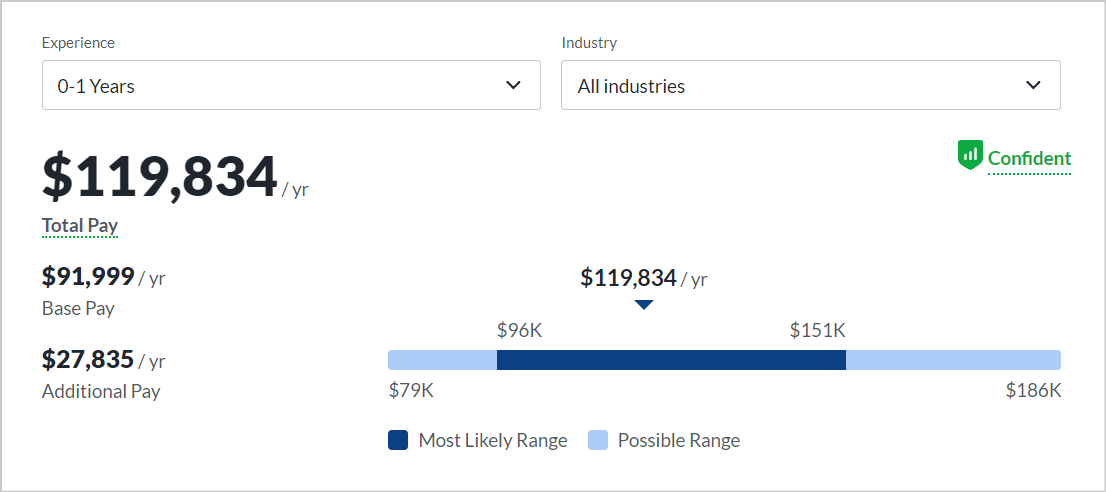
A data modeler is a sought-after professional, so even entry-level roles receive significant compensation. According to Glassdoor, juniors can expect a total pay of over $100,000 during their first year of work.
Mid-Level Data Modeler
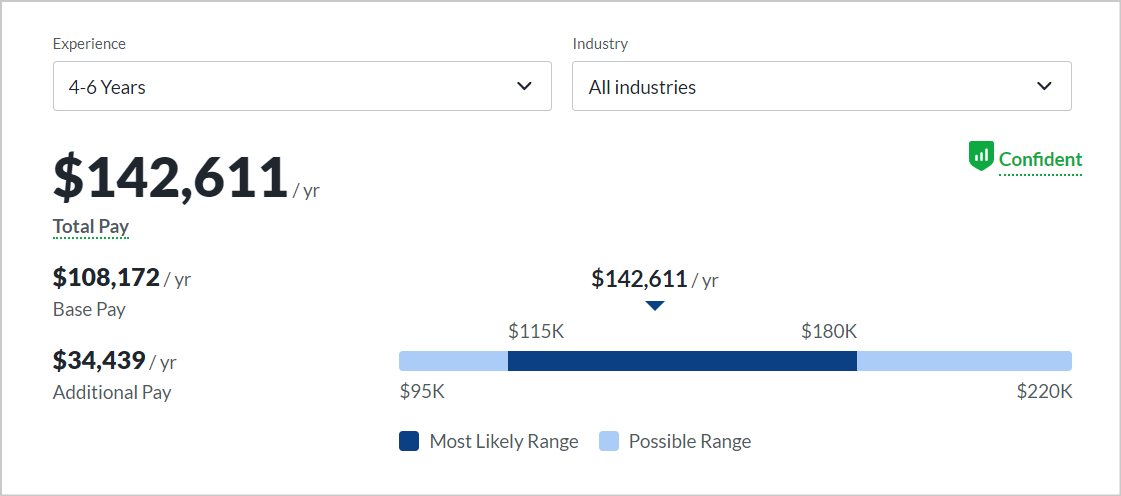
After working for a handful of years, you can expect your salary to go up by $10,000-$30,000. This can be achieved through pay raises, promotions, or getting hired at a new company at a higher level.
Although salaries can increase naturally, most pay raises are something you need to actively work towards by finding new opportunities in your company or elsewhere in the industry.
Senior Data Modeler
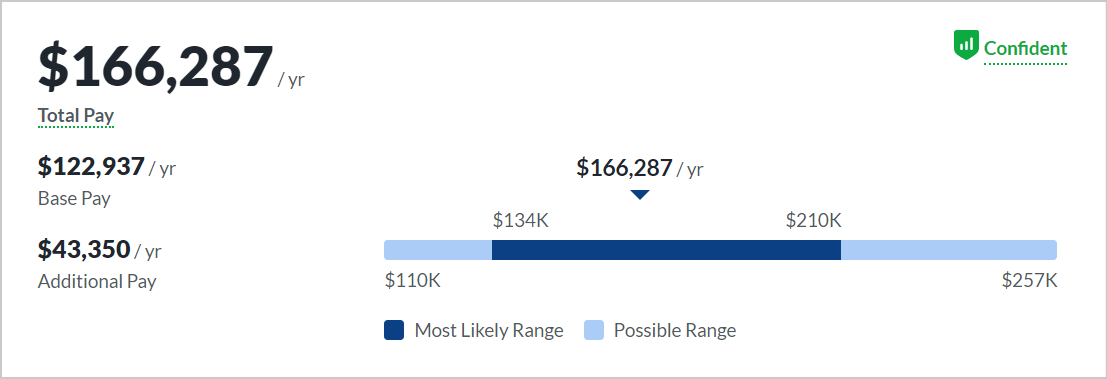
Data modelers with over 15 years of experience in database design and modeling methods are likely to have a range of high-paid opportunities to choose from. With an average salary of $166,287 and a maximum salary of $257,000, modelers at this level can work with the top companies and negotiate lucrative compensation.
Where Can You Find Data Modeling Jobs?
There are many ways you can find data modeler roles to apply to, and it’s best to use a combination of sites and methods to maximize your success.
You can both find job postings on LinkedIn and receive offers straight to your inbox. To use LinkedIn efficiently, ensure you have the app downloaded, and your notifications turned on, so you always know when you receive a message. Time is of the essence when it comes to job applications.
Job Boards
Visit job boards like Indeed, Glassdoor, Monster, and Dice frequently in order to respond to new job postings as quickly as possible. These sites receive thousands of new postings a day, and you never know when the perfect position will appear.
Network
If you already know people in the industry, taking advantage of their knowledge and connections can be one of the best ways to find new opportunities. Additionally, if you know someone that works for a company you want to apply to, ask for a referral so your application gets higher priority.
How To Become a Data Modeler FAQs
Here are some of the things people most want to know about data modeling jobs and how to get them.
Is Data Modeling a Good Career?
Data modeling is a highly sought-after role because data plays such a significant role in business today. This translates to job security and high compensation. Data modelers also have the knowledge and skills needed for positions in data science, analysis, and other data-related areas.
How Long Does It Take To Become a Data Modeler?
If you’re a beginner that wants to fast-track your data modeling career, you can enroll in a data bootcamp that will get you job-ready in under a year. This is one of the fastest and most immersive ways to train for the job, but you can also choose slower methods like four-year degrees or self-study.
Is Data Modeling Hard To Learn?
Data modeling requires a lot of specialized knowledge, but it’s not difficult to learn. Rather than needing a specific talent, you just need to go the extra mile to get noticed by employers.
Does Data Modeling Require Coding?
Experience with programming languages can be beneficial for data modelers, but the only essential language to know is SQL. This is the specialized language used for interacting with and manipulating databases, and data modelers use this tool every day.
How Does a Data Modeler Differ From a Data Analyst?
Data modelers and data analysts often work together, but their overall goals are different. Analysts wrangle and analyze data to find new insights that stakeholders can use to inform their business decisions, whereas modelers design how the company’s data as a whole is stored so employees such as analysts can access it efficiently.
Since you’re here…
Curious about a career in data science? Experiment with our free data science learning path, or join our Data Science Bootcamp, where you’ll only pay tuition after getting a job in the field. We’re confident because our courses work – check out our student success stories to get inspired.





